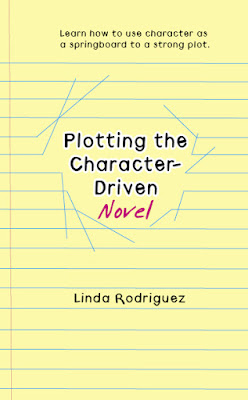For Native American Heritage Month, here is a poem about my grandmother, who was so influential in my life, even though she died when I was thirteen. Like a lot of families, mine was torn apart by divorce when I was young, and as great as the loss of my father was, I think the loss of his family, my grandmother and aunt, was even more traumatic. These women had been the strong stable base of my childhood while both parents were chaotic children. Once the divorce occurred, I lost that stability and their wisdom, but never their love. Fortunately, as an adult, I could and did seek out my aunt while she was still alive and rebuilt the family connection. Unfortunately, my grandmother was long gone by then.
GRANDMOTHER’S BASKET
I loved Grandmother’s baskets when I
was small.
They had intricate patterns and figures
woven into them in brown, black,
yellow, red, and orange.
She had different sizes and shapes,
used them for storage rather than
display.
My favorite was in reds and yellows
with a black border.
It looked to me as if woven of fire and
grasses.
I would climb into cupboards, find one,
and ask why she didn’t keep it out on
a tabletop
where everyone who came in could admire
it.
“These aren’t the best ones,” she
said
as she fingered baskets that looked
beautiful to me.
“We used to make them from rivercane,
which makes a better basket and dyes
the best,
but they rounded us up in concentration
camps
and drove us on a death march to a new
land
that didn’t have our old plants like
rivercane
so now we use buckbrush and
honeysuckle.”
Grandmother shrugged. “You make do.”
I asked her to teach me how to make a
basket
like the one I loved with feathers of
fire
along its steep sides. She shook her
head.
“It’s a lot of hard work.
First, we need black walnut, blood
root,
pokeweed, elderberry. Yellow root’s
the best yellow,
but blood root will have to do.
They’ve dug all the yellow root
for rich people’s medicines, call it
goldenseal.
Got to have our dyestuffs first.
Got to forage for most of them.
It takes lots of trips, out and back,
to get enough to make good colors.”
I knew I could do that and said so.
She laughed. “You’ve got to know
what to pick
or dig or gather. It’s like with my
medicines.
Can’t just go taking any old weed.”
I pointed out that I was learning from
her
about the Cherokee medicine plants. She
just shook her head.
“It’s not the same. I grow most of
those.
Haven’t taken you out for the wild
ones yet
because you’re too little still. Same
for dye plants.”
I nagged at her for days, begging her
to teach me
so I could have a basket of my own.
I had in mind that amazing
fire-flickering basket.
I wanted to make one just like that.
My visit was over without her ever
giving in.
I was used to Grandmother’s strength
of will.
I knew I would have to try harder next
time.
There was no next-time visit.
My mother had always hated her
mother-in-law.
Now, she won the battle to keep us
away.
Our relationship poured out in letters
until my mother destroyed them,
refused further correspondence.
Years later, Grandmother wrote me—
a letter that slipped past my mother’s
scrutiny—
that she was making a basket
one last time for me.
I knew she was very ill,
soon to die.
I don’t know who got the beautiful
baskets
when Grandmother died, especially the
one
that I loved when I was small.
Her sister and niece who cared for her
in her last illness, I suppose.
That’s fair. My parents had divorced
by then,
and my mother allowed no contact
with that family. But
a lumpy, brown-paper-bag-wrapped
package
with Grandmother’s shaky, spidery
handwriting
arrived for me after her death.
My mother opened it first and laughed.
I stood waiting eagerly to snatch up
the last thing my grandmother would
ever give me.
“Look at that,” Mother said with
more laughter.
“That ugly old thing’s supposed to
be a basket,
I think. She sure lost her knack for
that
at the end, didn’t she?”
When I was small and visiting, I knew
Grandmother already had arthritis
in her hands. That’s probably why
she wouldn’t teach me to make
baskets—
because she didn’t have the dexterity
any longer
to make the kind she once had.
I still have that simple handled basket
of vines (probably honeysuckle).
The whole thing is dyed black.
There are no intricate patterns of
flames
or anything else. It’s just solid
black.
I can see her plodding out to gather
butternuts for the black dye
and to pull the honeysuckle vines,
stripping off the leaves.
I can see her gnarled hands
painstakingly weaving under and over,
no fancy twills or double-woven sides.
Hard enough to shape
a shallow but sturdy gathering basket
for her long-unseen granddaughter.
All these years later
I have my own herb garden
where many of her medicine plants grow.
When I gather them to dry for teas and
poultices,
I use that black vine basket.
I think it will last forever.
Published in Dark Sister (Mammoth Publications,, forthcoming)










